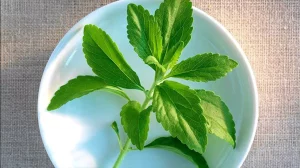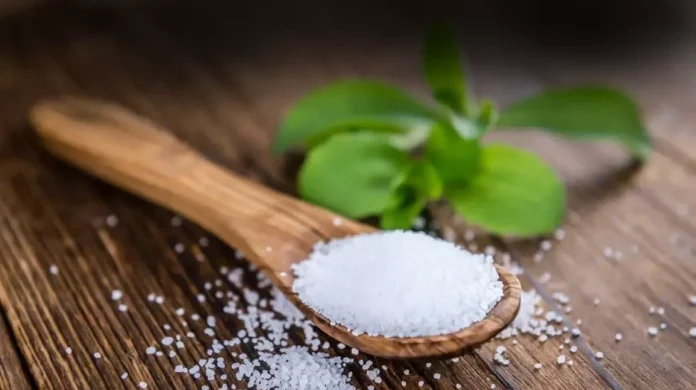Stevia and Its Nutritional Constituents
Stevia is a natural sweetener extracted from the leaves of the Stevia rebaudiana plant. It has gained popularity as a low-calorie and natural alternative to sugar. Stevia is almost 200 to 300 times sweeter than regular sugar and has no calories, making it an attractive option for those trying to reduce their calorie intake.
In addition to its sweetness, stevia has several nutritional constituents that make it a healthy choice. Stevia contains various vitamins and minerals, including vitamin C, calcium, potassium, magnesium, and zinc. It is also a rich source of antioxidants, which help to protect cells from damage caused by free radicals.
Stevia also has a very low glycemic index, meaning it does not raise blood sugar levels like regular sugar. This makes it an excellent choice for people with diabetes or anyone trying to manage their blood sugar levels.
Overall, stevia is a healthy alternative to sugar and offers several nutritional benefits. However, as with any sweetener, it is crucial to consume it in moderation and as part of a balanced diet.
Stevia leaf extract derives from the leaves of the stevia rebaudiana Bertoni plant—more generally known as “stevia”. For millennia, stevia has been a source of high-intensity sweetness, however, the sweetness generated was sometimes uneven and contained stray tastes. Tropical and subtropical regions are ideal for growing the stevia plant.

How to Culture, Harvest, and Extract Stevia
Small farms in Asia, South America, and other tropical/subtropical areas typically grow stevia plants. Stevia leaves are harvested and dried to extract the plant’s, intense sweetness.
- The leaves are then steeped in hot water.
- After multiple stages of filtering and centrifuging to concentrate the sweetest components of the leaf,
- The resulting purified stevia leaf extract is ready to be sold commercially.
Stevia leaf extract is comprised of steviol glycosides, which are the sweet-tasting parts of the leaves. Food-grade stevia leaf extract must have at least 95% steviol glycosides. In the majority of countries where stevia leaf extract is sold, this is the standard.
How to Refine, and Package Stevia Leaf Extract
Beginning with food-grade steviol glycosides, a company can package stevia leaf extract in a variety of different formats for a variety of product purposes. Because stevia leaf extract is very sweet (200-350 times the sweetness of sugar), you need much less to generate sugar-like sweetness. Very few doses of stevia leaf extract, on the other hand, will be difficult for individuals to use for everything.
Manufacturers make it easier to use the very sweet stevia leaf extract by mixing it with other components to balance out the sweetness. For example, stevia leaf extract can be combined with dextrose, maltodextrin, inulin, or erythritol to create a stevia-based sweetener that may be used in place of sugar to sweeten meals and beverages.
Benefits of Using Stevia Plant Extract
Here are some of the potential benefits of using stevia plant extract:
1. Low in Calories: Stevia plant extract is low in calories and is a great alternative to sugar. It has virtually zero calories and is a great option for those who are trying to lose weight or manage their blood sugar levels.
2. Does Not Raise Blood Sugar: Unlike sugar, stevia plant extract does not raise blood sugar levels, which makes it a great option for people with diabetes or those who are trying to reduce their sugar intake.
3. May Help with Weight Management: Stevia plant extract may help with weight management as it contains zero calories and is a substitute for sugar in a variety of foods and drinks.
4. May Have Antioxidant Properties: Some studies say that stevia plant extract has antioxidant properties, which means it could potentially help protect the body from damage caused by free radicals.
5. May Have Anti-Inflammatory Properties: Some research has shown that stevia plant extract may have anti-inflammatory properties, which could make it beneficial for people with inflammatory conditions such as arthritis.
More research is needed to fully understand the potential benefits and drawbacks of consuming stevia plant extract. Also speaking with a healthcare professional before making any significant dietary changes is always a smart idea.
Benefits of Stevia-Based Sweeteners vs. Artificial Sweeteners
Many individuals are curious about the differences between artificial and stevia sweeteners. Stevia sweeteners differ from artificial sweeteners in that their sweetness comes from a plant. Because of the origin of their sweetness, many people feel good about plant-based sweeteners.
Various international agencies confirm that there are no safety concerns with the intake of approved artificial sweeteners when you use them in accordance with local rules. The choice between stevia-based sweeteners and artificial sweeteners boils down to taste preference.
Taste is inherently subjective—everyone has a unique taste palate. As a result, there is no objective measure—no proof—that stevia-based sweeteners are superior to artificial sweeteners, or vice versa.
Stevia-based sweeteners get their sweetness from the tastiest sections of the stevia plant. The sweetness is removed from the leaves and then refined to produce a 95% pure stevia leaf extract.
If you prefer items with plant-based origins, a stevia-based sweetener may be right for you. Otherwise, it truly comes down to your taste preference.
Cooking and Baking With Stevia.
Many people enjoy cooking and baking with stevia as a healthier alternative to sugar. You can use the sweetener in a variety of recipes, including cupcakes, cakes, muffins, cookies, ice cream, smoothies, etc.
Baking with stevia requires a few adjustments such as using additional liquid or reducing oven temperatures for quick loaves of bread and cookies. You can also combine stevia with other natural sweeteners such as monk fruit or coconut sugar for additional sweetness without calories.
Side Effects of Using Stevia
Stevia is generally safe when intake is in moderate amounts, and normally there are no significant side effects. However, some people may experience mild side effects, particularly if they consume high doses of stevia. Here are some of the potential side effects of using stevia:
- Gastrointestinal Issues: Some people may experience gastrointestinal issues such as bloating, gas, or diarrhea when they consume large amounts of stevia.
- Allergic Reactions: In rare situations, some people may be allergic to stevia, causing itching, hives, or difficulty breathing.
- Reduce Blood Pressure: study shows stevia reduces blood pressure in certain people, which is useful for those with the high blood pressure but may be hazardous for those with low blood pressure.
- Interaction with Medications: Because stevia may interact with certain medications, notably those used to manage diabetes, it is critical to consult with a healthcare practitioner before using stevia if you are taking any medications.
Just like every other thing, in moderation, stevia is safe. But, as with any dietary supplement consult with a professional before making any dietary changes especially if you have allergies.
Common Questions About Swapping Sugar for Stevia
We often get asked whether or not it’s safe to substitute sugar with stevia in recipes. This depends on the processed form of stevia you’re using, as well as the type of recipe. In certain cases, like when making syrup or jam, it’s best to use only sugar.
However, if you’re baking cakes and cookies, using a combination of sugar and stevia might work better since it will keep your dessert from tasting too bland. It all comes down to experimentation so make sure to take notes when swapping sugar for stevia!

